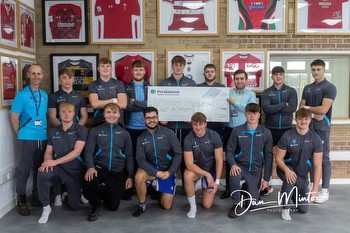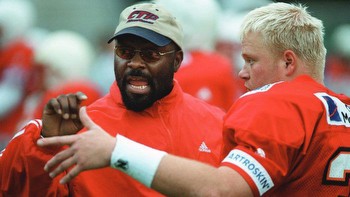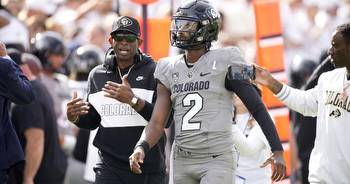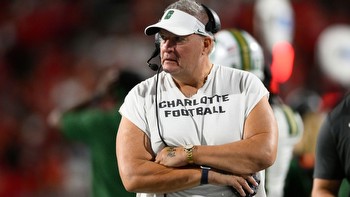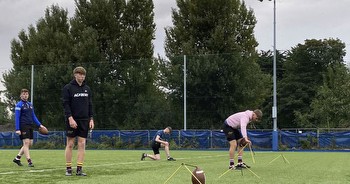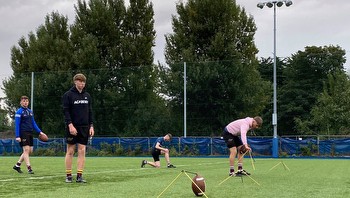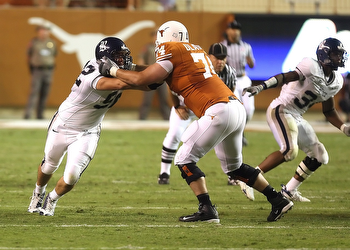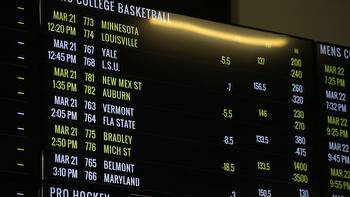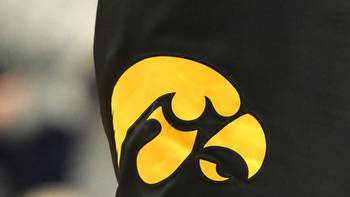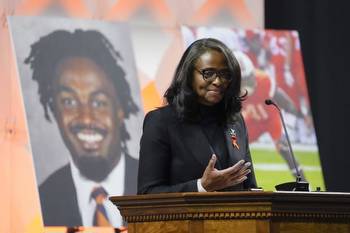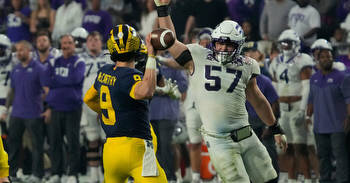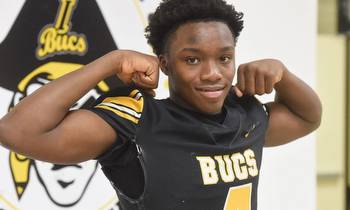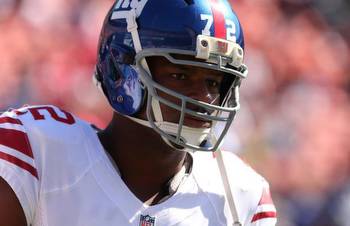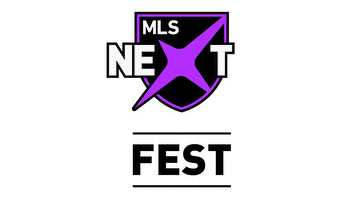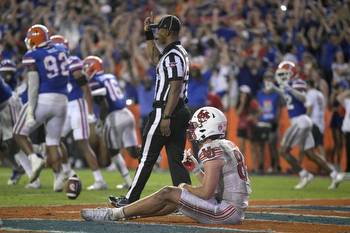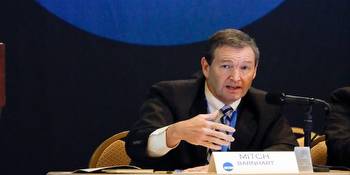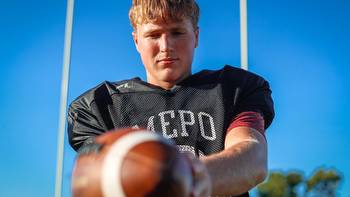How the NFL Academy is helping the league grow internationally
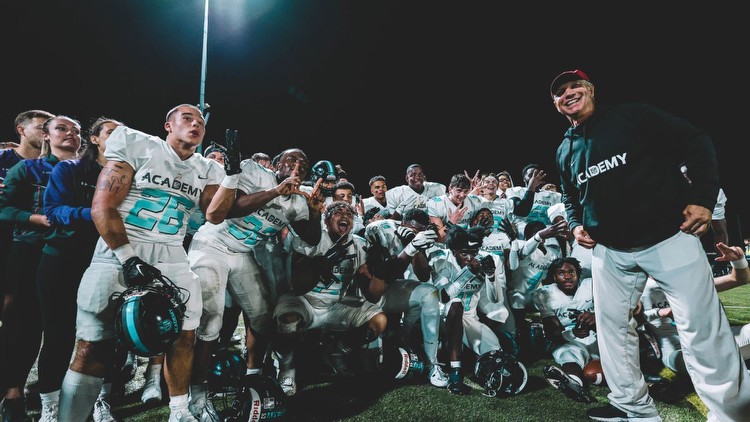
EMMANUEL OKOYE STEPPED out of the airport last September in London and the first thing he noticed was the cold. He wasn't prepared for it.
How in the span of a few months did he transform from a basketball player in Nigeria to a college prospect in a game he knew little about? He had watched football only on television, yet it was football -- American football -- that led him to get on the plane in Lagos in search of the opportunity he never knew existed.
Nigerian coaches spotted Okoye in 2022 while they were scouting for a football camp put on by former NFL player Osi Umenyiora. They convinced Okoye to give football a shot, bringing him to that camp in May 2022 and then another in Ghana.
He was offered a chance to go to the NFL Academy in Loughborough, England, where he would receive a high-level education and training. He would be among dozens of other players from around the world all with the same mission in mind: Play college football in the United States.
"My coach told me this is a lifetime opportunity," Okoye said. "You know, I don't want to miss this."
This all came so suddenly, so fast, he couldn't imagine what it would be like or where it would lead. But he had to do it.
Everything was new, from his roommates to his teammates to the sport he was now recruited to play, putting on a helmet for the first time last September. Every time he did something, it stood out -- from his 45-inch vertical jump to his 11-foot, 4-inch broad jump to his speed and his 7-foot-2 wingspan. Colleges noticed. He'd been at the NFL Academy for four months when the scholarship offers came.
Offer after offer arrived, which led to official visits in the United States. By the time he committed to Tennessee as a defensive end who would transition to tight end, he also had offers from USC, Texas Tech and Georgia, among others. It usually doesn't happen this fast, but Okoye is the epitome of what the NFL is trying to do overseas.
In an effort to grow the game internationally and on the grassroots level, the league created the NFL Academy in 2019. The academy has grown to a group of 62 players from 13 countries -- primarily from Europe and Africa -- who are there to learn the game and potentially receive college scholarships.
This is all part of a larger global strategy for the NFL. It's reflected in flag football, which is growing worldwide among men and women and could be a future Olympic sport. It's reflected by the league holding games overseas -- except for the COVID year in 2020, the NFL has had at least one regular-season game abroad since 2007 and has five this season between England and Germany. On Sunday, the Baltimore Ravens and Tennessee Titans will play the third straight game in London this season.
It's shown in the International Pathway Program, designed to put international players on NFL practice squads, and in the academy in Loughborough. The league is looking to open a second academy in Australia, which has produced a number of NFL punters, to broaden its reach.
"Football is not just an American sport. It is international. It is growing. We are just a part of the thing for it to be a global sport," said Kris Durham, the NFL Academy's head of football. "We want to be like basketball. We want to be like baseball.
"We want to sit here and touch nations and different countries and continue to grow."
Umenyiora: Okoye's 'African spirit' will help at Vols
New Tennessee Volunteers commit Emmanuel Okoye only started playing football in 2021, but mentor Osi Umenyiora says the 18-year-old will be just fine thanks to his Nigerian upbringing.
THE PLACE OKOYE arrived at was not where the NFL Academy held its first three seasons. The academy moved from London to Loughborough last September in order to offer a higher level of service.
Loughborough College is widely considered one of the best sports academies in Europe, featuring alumni including English national soccer team members Ben Chilwell (Chelsea) and Jude Bellingham (Real Madrid). The combination of the college and Loughborough University next door offered the academic and athletic standards the NFL sought, including accommodations for athletes and dedicated performance teams. The football athletes now live on campus in flats with their teammates and other athletes.
Loughborough was interested in partnering with the NFL, too. Its head of school, Jo Maher, is a longtime Seattle Seahawks fan. She understood the gravity of working with the NFL. So when the possibility came for the school and the NFL to sign a long-term deal, it became a priority.
In preparing its plan, the only thing the school missed on in the first year was the amount of food needed to feed the athletes. Maher said the money the school spent on food last year was almost 50% over the initial budget.
Everything else went about as well as both sides could have wanted.
"The NFL is unique in the UK's concept, and obviously this is culture in America," Maher said. "Education is at the heart of your sport. You cannot enter the draft if you don't go to college.
"In the UK, that doesn't happen."
As Maher, with a background in sports science and sports psychology, and her team put together their pitch in 2021 -- in the midst of the COVID-19 pandemic -- they tried to think of everything. They went through the student visa processes and what scores would be needed on required tests for UK visas. They made sure their curriculum met NCAA requirements.
The daily structure at the academy is similar to an American high school or university. The day begins with practice at 7 a.m. Then meals and a full day of classes. Then more meetings after classes and time to study before heading to bed.
— NFL Academy (@NFLAcademy) October 4, 2023
To help players with the transition, the academy hired a mix of American and international coaches and staff. The team's first-year head coach, Steve Hagen, has coached college and NFL football since 1984, including stops at Notre Dame, North Carolina, the Cleveland Browns and the New York Jets. Lamonte Winston, the head of the academy, worked in American football for 37 years including as the Oakland Raiders' director of player engagement and the Kansas City Chiefs' executive director of player development.
Durham is a four-year NFL vet who played college football at Georgia and in the pros for the Seahawks, Detroit Lions and Titans before finishing his career playing in Italy for the Parma Panthers. Alison Wyeth, a long-distance runner who represented Great Britain in the 1992 and 1996 Olympics, is the academy's director and handles many logistics.
"When you're trailblazing in anything and you're the first to do anything, you have to carry all of that," Maher said. "Well, if you're from the UK, can you play football? Why aren't you playing soccer?
"You've got to be the one that myth-busts all that, that shows who you are, that shows your talent. And that's why character development is important to the program."
The goal is to have 150 foreign-born players in the NFL by 2030 -- there are currently 67 active players who were born outside the U.S., according to Elias Sports Bureau. Durham's hope is the Academy shows what is possible for future generations in other nations, like when former Lions Pro Bowl defensive end Ziggy Ansah, a former teammate of Durham's, made the NFL from Ghana.
In June, Atlanta Falcons head coach Arthur Smith spoke to academy players when they visited the team's practice facility, offering advice on how to make it to the NFL. He long has paid attention to the league's efforts to grow the game abroad.
"The game continues to develop," Smith said. "There's talented athletes around the world. You saw that with basketball."
Last Friday was another step, when the academy beat a high school team from the United States, IMG Academy White, 31-14. It was the first win for the academy over a team from the United States.
The win could attract college attention. The academy now boasts multiple alumni in the FBS, including Okoye and Temple freshman tight end Peter Clarke, who caught his first pass, a touchdown, Saturday against UTSA.
There's a bigger objective in mind, though.
"That's the next major milestone of the program," said Daniel Akinkunmi, one of the top prospects in this year's academy class. "For one of us to get drafted."
AKINKUNMI WANTEDTO play college basketball. But when playing Division I basketball no longer seemed realistic, Akinkunmi started seeking out other sports. The NFL Academy had recently opened in London, so he figured he would give it a try.
The first year was hard, between school, learning a sport he had never played and a hellacious five-day-a-week commute starting at 5 a.m., consisting of a nearly three-hour train ride from Doncaster to London. Then school, practice and a return journey.
By his second year, the Academy moved to Loughborough and students lived there full-time. It meant Akinkunmi could get eight hours of sleep instead of four, and that he could focus on recovery and training.
To gain attention from coaches in the United States, he started a Twitter (now X) account and posted his highlights, something he eventually taught Okoye how to do when he arrived a year later.
"I knew what he needed to do to be seen by coaches," Akinkunmi said. "I helped him out to create his social media account, to help him start building his brand with Twitter. Same thing I did to help me get recruited."
Akinkunmi was a good role model. His first summer tour in the United States -- the academy takes annual tours to college camps and campuses for exposure in different areas of the country, including to Clemson and Georgia earlier this year -- helped land him a handful of offers as a sophomore, six months after he started playing football, because he showed he could compete against American competition.
— NFL Academy (@NFLAcademy) October 9, 2023
That number has grown to over 30 offers, and he plans to announce his commitment on Thursday. Much of the attention came last summer, when he and the rest of the students took a tour of campuses in the South and spent a day at the Falcons facilities.
This is part of how the Academy structures its exposure. Playing a handful of American high schools -- three games this year, one in Dublin and two in England, including Tuesday against Brooklyn's Erasmus Hall -- can go only so far.
"To be honest, they've done what they've said," Akinkunmi said. "From taking these trips fully funded to giving me gear to hosting me at Loughborough now to paying for food, accommodation. So now, it's got to the level where they've really helped me."
While Okoye and Akinkunmi have received a lot of attention, there's hope the spotlight can help their teammates get noticed, too. Whenever a player gets an offer, there's a group thread with congratulatory texts. When Akinkunmi was selected for a high school all-star game earlier this year, his teammates were there.
They all have their stories of how they arrived with the same goal in mind. Like Sunday Samuel, a receiver from Nigeria. As a kid, he watched YouTube videos of Jerry Rice, went outside and then filmed himself emulating the Hall of Famer through drills set up with cones.
He left his home in northern Nigeria to find work in Lagos, the country's capital, at age 17 to help his family. Samuel struggled, seeking out small jobs to send money back to his mother. With him, he carried a football, cones and tennis balls to catch in his bag. When he found time, he set up cones on the beach and played catch -- often by himself.
He did this for about three months when he heard about Umenyiora's camp in Nigeria. His work ethic and skill set left an impression, and he received an invite to a second camp and then one to the academy with Okoye.
"To play football and also go to school free," Samuel said. "You don't come across this every day. It's a dream come true.
"It's like actualizing something from your thoughts, which is crazy."
Samuel is hoping he's next. His goal, like that of many of the kids, is simple. Get to college. Get to the NFL. Football, he believes, can get him to a better future.
"Football," Samuel said. "Gave me a chance to dream again."
HAGEN WAS ON a ferry from Wales to Ireland in August. He'd been on a double-decker bus across an entire country with a trailer in tow, and now he was heading to Dublin to coach a high school football game.
The NFL Academy players stayed in a youth hostel sharing bunk beds; the coaches were at a hotel close by. Warmups were outside the stadium because they weren't allowed on the field until the game started.
A coaching lifer, Hagen had coached in 11 states over four decades and coached in Italy for a year. This was different, working with high school kids hoping to get college scholarships. He arrived in the UK having visited only once for a Jets-Dolphins game a few years back, this time to coach players who didn't know the game. He didn't know much about his players, other than they were from Europe and Africa.
There were challenges, although it helped that he and Winston worked together at Nevada three decades earlier. Hagen believes his team speaks 14 different languages. His defensive coordinator is from Spain.
Prior to Hagen's arrival, practice had been thrice weekly. Now, they practice daily. He brought in a culture similar to what he's worked with in college and the NFL.
"To us, the standard is Power 5 football," Hagen said. "I know this is a high school academy, but we're trying to get these guys to Power 5."
Hagen likened their approach, in part due to visas and in part due to the realities of consistent recruiting across the world, to an American junior college. They're constantly finding players with the hope of setting them up for a bigger future.
Bringing Hagen over helped with exposure for the academy's players, too. His contacts run deep, and college coaches ask him versions of the same question after seeing Instagram tape: What do you think? Can he play? His opinion is respected.
"Even though we're not from the U.S., we can still ball," Akinkunmi said. "We can still play football at the same level the U.S. plays football. It doesn't matter where you play, it matters how you play it."

